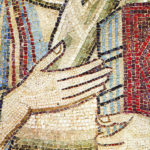We run our website the way we wished the whole internet worked: we provide high quality original content with no ads. We are funded solely by your direct support. Please consider supporting this project.
The Cross in the Mirror
For those who are just tuning in, we are in the midst of a series that is fleshing out the theology of The ReKnew Manifesto. So far I’ve argued that the cross is the definitive revelation of God and that it should therefore be the centerpiece of our hermeneutic (interpretation of the Bible) as well as all our thinking about God. I’d like to end our reflections on the centrality of the cross by saying a word about how the cross should affect the way we see ourselves.[1]
We hear a lot about self-esteem these days. I’ve read books that basically argued that almost every psychological and/or social problem we have is due to a lack of self-esteem. On the other side of the fence, however, there is that multitude of Christian spokespeople who argue the opposite: the source of all our problems, they say, is that we have too much self-esteem. We are prideful, in other words. So while the first group is always telling us how much better we are than we tend to think, the second group is always telling us how much worse we are than we tend to think.
It seems to me that the cross exposes both perspectives to be completely misguided. The problem isn’t with our low or high self-esteem: the problem is that we self-esteem. We evaluate ourselves on the basis of whatever criteria our social group deems important—e.g. how pretty, smart, rich, talented or famous we are—and we feel good about ourselves if we meet the criteria and feel bad about ourselves if we don’t. But the cross reveals that the very process of esteeming ourselves is as impossible as it is unnecessary.
The self-esteeming process is impossible because the cross reveals that we are sinners whose plight was so bad it required God to become a human and to die on a cross to save us. Left to ourselves, we are too lost and screwed up to ever think we could increase our worth by how well we measure up against some social criteria. At the same time, the self-esteeming process is unnecessary, for the cross reveals that God deemed us worth dying for, even while we were sinners. In fact, by paying an unsurpassable price for us, God ascribes unsurpassable worth to us. And since this worth is unsurpassable, it can’t be improved, regardless of how pretty, smart, rich, talented, or famous we happen to be. At the same time, because this worth is given by God, neither can this worth ever be lessened, regardless of how ugly, dumb, poor, untalented and unknown we happen to be.
Given that the cross reveals all we can know about God and ourselves, our goal should not be to acquire better self-esteem; it should be to acquire God-esteem. Who cares what our little screwed up brains think about ourselves when our Creator, the only one who really knows our true worth, has revealed his opinion on the cross. However high you may esteem yourself, it will fall infinitely below the worth God has already given you for free. Yet, the very process of esteeming yourself, regardless of how high or how low your outcome is, reflects a lack of trust in the cross.
In this light, I’d like to encourage us to drink every day from the well of the infinite worth that God ascribes to us on the cross. When we fully agree with God that we have unconditional and unsurpassable worth, it frees us from the need to try to acquire worth by satisfying some social criteria. So, when you find yourself feeling good, feeling bad, or even just being concerned about how pretty, smart, rich, talented, or famous you are, turn your attention to the cross and ask: what does my heavenly Father think?
To reflect on this a bit further, listen to this sermon.
[1] I’d like to thank my friend Dan Kent for inspiring me to write this post. Dan gave an outstanding presentation for a group at my house the other night in which he applied some material from my Repenting of Religion to the problem of shame and pride in psychology. Dan is currently writing a book on this subject, and I believe many of you are going to want to read it when it’s done!
Category: Essays
Tags: Essay, ReKnew Manifesto, Self-Worth
Topics: Atonement and The Cross, Following Jesus, Interpreting Violent Pictures and Troubling Behaviors
Related Reading

The “Christus Victor” View of the Atonement
God accomplished many things by having his Son become incarnate and die on Calvary. Through Christ God revealed the definitive truth about himself (Rom 5:8, cf. Jn 14:7-10); reconciled all things, including humans, to himself (2 Cor 5:18-19; Col 1:20-22), forgave us our sins (Ac 13:38; Eph 1:7); healed us from our sin-diseased nature (1…

The Rorschach Test
The choices we make will either increase or decrease our ability to recognize light when we see it. As we choose goodness, we increase our capacity for goodness. What do you see when you read the Bible or look at God or interact with others? Everything is a Rorschach test to some extent, revealing the light…

Our Beautiful, Nightmarish World
The Bible consistently proclaims that the creation reflects the glory of God. To me, the truth of this proclamation is undeniable. When I was younger I several times went on three-week solo backpacking trips into the mountainous forests of Montana. If gazing at the star studded sky on a moonless night at the peak of…

Old Testament Support for the Warfare Worldview
Rebuking Hostile Waters Satan plays a minor role in the Old Testament relative to the New Testament. Instead, the warfare worldview in the Old Testament is expressed in terms of God’s conflict with hostile waters, cosmic monsters, and other gods.Like their Ancient Near Eastern neighbors, ancient Jews believed that the earth was founded upon and…

Is the Book of Acts Reliable?
(Note: We apologize that certain German vowels didn’t translate onto this site). Introduction The book of Acts is of critical importance in the contemporary debate about the historical Jesus. The reason for this is straightforward. Those who deny that the original, historical Jesus made divine claims for himself, performed miracles and rose from the dead…

The Cruciform Center Part 4: How Revelation Reveals a Cruciform God
I’ve been arguing that, while everything Jesus did and taught revealed God, the character of the God he reveals is most perfectly expressed by his loving sacrifice on the cross. Our theology and our reading of Scripture should therefore not merely be “Christocentric”: it should be “crucicentric.” My claim, which I will attempt to demonstrate…
